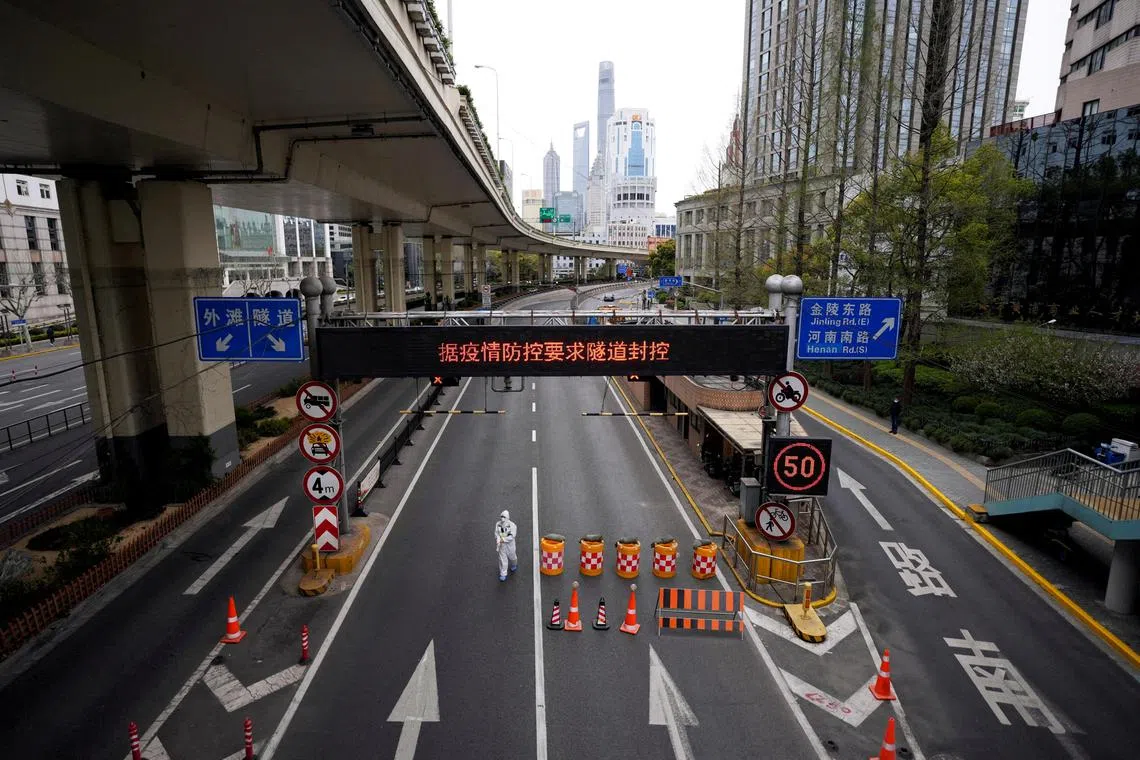China’s $31 trillion local debt mess is about to get worse
Sign up now: Get ST's newsletters delivered to your inbox

Civil servants in wealthy cities like Shanghai are reportedly having their pay slashed.
PHOTO: REUTERS
BEIJING – In 2021, a remote coal town in north-eastern China was forced to undergo an unprecedented financial restructuring. Its struggles since are an ominous sign for President Xi Jinping as other heavily indebted municipalities look set to follow suit.
Hegang, a city with nearly a million people near the Russian border, had debt of more than double its fiscal income when it hit the headlines almost 18 months ago.
Its residents are now feeling the brunt of the fiscal clampdown. During a recent visit to the city, locals complained about a lack of indoor heating in freezing winter temperatures, and taxi drivers said they were being penalised with more traffic fines. Public school teachers worried about rumoured job cuts, and street cleaners endured two-month delays to their salaries.
Hegang represents just the tip of the iceberg of a local government debt problem that is making investors increasingly nervous, and that threatens to be a drag on the world’s second-largest economy for years to come.
Goldman Sachs estimates that China’s total government debt is about US$23 trillion (S$31 trillion), a figure that includes the hidden borrowing of thousands of financing companies set up by provinces and cities.
While the chance of a municipal default in China is relatively low given Beijing’s implicit guarantee on the debt, the bigger worry is that local governments will have to make painful spending cuts or divert money away from growth-boosting projects to continue repaying their debt.
“Many cities will become like Hegang in a few years’ time,” said Mr Song Houze, an economist at American think-tank MacroPolo, noting that China’s ageing and shrinking population means many cities do not have the workforce to sustain faster economic growth and tax revenue.
“The central government may be able to keep things stable in the short term by asking banks to roll over local governments’ debt,” Mr Song said.
But without loan extensions, “the reality is that over two-thirds of the localities won’t be able to repay their debt on time”, he added.
In Heilongjiang province, where Hegang is located, bond investors are already wary of the risks. The province’s outstanding seven-year bond had an average yield of 3.53 per cent, 18.8 basis points higher than the average nationwide, ranking it among the top four most expensive.
A fiscal restructuring can be triggered in one of two ways: if interest payments on a municipality’s bonds exceed 10 per cent of its expenditure, or if local leaders deem it is necessary.
China-based Yuekai Securities estimated that as many as 17 cities had bond interest payments of more than 7 per cent of their budgeted expenditure in 2020, meaning they are close to breaching that 10 per cent threshold. The cities are mainly in poorer provinces like Liaoning in the north-east and Inner Mongolia up north.
Unlike a corporate debt restructuring, a fiscal restructuring in China does not imply that creditors must take losses on what they are owed.
Problems are evident in other cities as well.
Shangqiu, a city of 7.7 million people in China’s central Henan province, made headlines recently after almost shutting down its only bus service. In Wuhan and Guangzhou, proposed cuts to pensioners’ medical benefits prompted rare street protests earlier in 2023. Civil servants in wealthy cities like Shanghai are reportedly having their pay slashed. In Guizhou province, officials have begged Beijing for a bailout.
Beijing has been pushing local governments to curb debt risks for years, especially the “hidden” kind – referring to debt raised by financing vehicles on behalf of municipalities, but which does not show up on the balance sheets of the localities. Finance Minister Liu Kun and other officials have sought to ease public concerns by saying local government finances are overall “stable”.
Stanford University political science professor Jean Oi, who specialises in China’s fiscal reforms, said: “The local government debt problem is spread throughout the country. While rich coastal areas will have more opportunities to repay their debt and more resources to draw on, less-developed places like Hegang are going to be much more limited in what they can do.” BLOOMBERG


